Gordon Ball reading from ’66 Frames
August 28, 2018 by David
Filed under AuthorsVoices
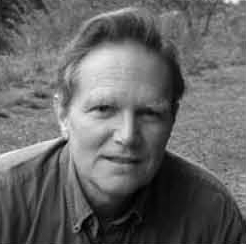 ’66 Frames – Gordon Ball – Coffee House Press – 9781566890823 – paperback – 320 pages – $15.95
’66 Frames – Gordon Ball – Coffee House Press – 9781566890823 – paperback – 320 pages – $15.95
Allen Ginsberg, who helped Ball with some of the research for his book, once remarked on Ball’s vantage point:
From city and country communes, underground and avant garde film and photography,
Gordon Ball has been marvelously placed as participant and observer of many
extraordinary art situations.
’66 Frames: A Memoir (Coffee House Press, l999, introduction by Jonas Mekas), is an account of one year in Ball’s life thirty-five years ago, working in avant garde film, immersed in New York’s counterculture. Its readers have responded with enthusiasm, as these comments suggest:
This book made me want to take acid and have sex with lots of people. It also made me want to stay up all night in the company of my genius friends in the mid-sixties in New York’s Lower East Side. It also made me grateful for not being twenty and living in a war-wracked, generation-torn, paranoid world. Gordon Ball writes with compassion and nostalgia about a unique and nearly indescribable epoch.
–Andrei Codrescu
’66 Frames is a beautifully written book which captures the spirit of those times better than any other book I know.
–Filmmaker Stan Brakhage
Gordon Ball’s own website includes a gallery of his photographs of Ginsberg and others.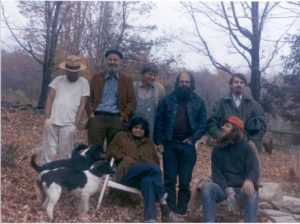
Podcast: Play in new window | Download
Gordon Ball: East Hill Farm: Seasons with Allen Ginsberg
August 28, 2018 by David
Filed under Non-Fiction, WritersCast
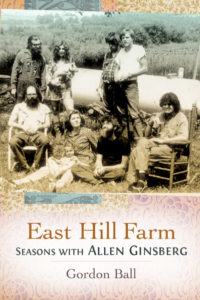 East Hill Farm: Seasons with Allen Ginsberg – Gordon Ball – Counterpoint Press – 416 pages – paperback – 9781619020177 – $18.95 – December 11, 2012 – ebook edition available at lower prices
East Hill Farm: Seasons with Allen Ginsberg – Gordon Ball – Counterpoint Press – 416 pages – paperback – 9781619020177 – $18.95 – December 11, 2012 – ebook edition available at lower prices
It’s been a great pleasure for me to be able to interview writer friends and editors about their work for the Writerscast and Publishing Talks podcasts. I first met writer, film-maker and now professor Gordon Ball soon after moving to Chapel Hill, North Carolina at the very end of 1973. I knew almost no one in North Carolina, but in those still counter-cultural days of boomer history, it was relatively easy to make friends, especially within the fairly small community of like-minded poets and writers that laid-back college town oasis attracted.
Gordon Ball was in Chapel Hill for graduate school, after spending several years as the amanuensis and farm manager for Allen Ginsberg at his funky farm refuge in Cherry Valley, New York. How Gordon got to be there, and what happened during his time among the heroes of the Beat Generation and the hippie revolutionists who followed them is the subject of his excellent and enjoyable memoir, East Hill Farm.
Allen Ginsberg was unique, as a poet who became a cultural icon, a political and spiritual leader whose writing has influenced millions of readers. East Hill Farm was his attempt to build a refuge from city life – “a haven for comrades in distress,” especially friends whose lives were being ruined by hard drugs like iconic beat poets Herbert Huncke and Ray Bremser, who both spent time at the farm in the late sixties. Gordon recounts his first hand stories of the refugees who arrived there as well as the many local upstate characters who helped make the dilapidated farm into a livable home and a functioning farm of sorts. This story is emblematic of so many “back to the land” excursions from the sixties, when hippies from the cities and suburbs arrived uninvited in small town farm communities in places like Vermont, Maine, northern California, Oregon and of course, upstate New York.
But he also tells us about his own journey, his family, the loves and losses that he experienced in this heady era when millions of young people all around the world revolted against the constraints of post-War modern capitalism, all trying to find a different way to live. His experiences and those of his compatriots help us understand how that special moment in our history was lived, and perhaps also, why it could not last or lead to the kind of social change its participants believed in and hoped for.
But what a great experience it was. And so much of what happened there will not be lost or forgotten because of this book.
“I couldn’t stop reading East Hill Farm and learning so much of what really went down on that farm in that so crucial period in the lives of the Beats. I visited the farm just twice but wish I had had Ball’s innocent yet so perceptive eye.” —Lawrence Ferlinghetti, author of A Coney Island of Mind.
“In the late 1960s, poet Allen Ginsberg bought an isolated, broken-down farm in upstate New York as a retreat for himself and his worn-out, burned-out friends. Ginsberg hoped to create an Elysium where they could escape from the urban pressures and drug addictions that had laid Kerouac, Corso, Orlovsky, and Huncke so low. Only a masterful story-teller like Gordon Ball could turn a depressing tale of poets at rock bottom into a triumph of the human spirit.”—Bill Morgan, author of I Celebrate Myself: The Somewhat Private Life of Allen Ginsberg
Gordon Ball photographed Allen Ginsberg and the Beat Generation for many years. As well as being exhibited at five conferences on Ginsberg and the Beat Generation, at one-man shows at the Southeastern Center for Contemporary Art and other venues, Ball’s photos have appeared in many publications. Gordon is the author of 66 Frames: A Memoir and a volume of prose poems, Dark Music. He lives in Lexington, Virginia, taught at VMI and now is teaching at Washington and Lee University. Author website here.
East Hill Farm is a charming, warm memoir that will be a compelling read for anyone who wants to know what it was like to live through the sixties with a cast of some amazing characters, many of whom helped create the culture we still experience today. It was great fun for me to reconnect with Gordon after so many years, and to share his experiences and memories through this wonderful book.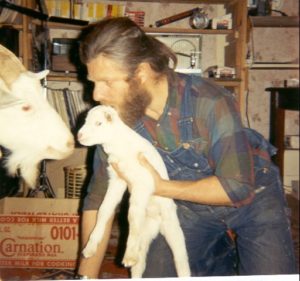
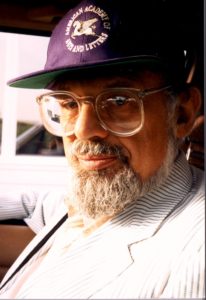


Podcast: Play in new window | Download
Steve Steinberg: Urban Shocker: Silent Hero of Baseball’s Golden Age
April 15, 2018 by David
Filed under Non-Fiction, WritersCast
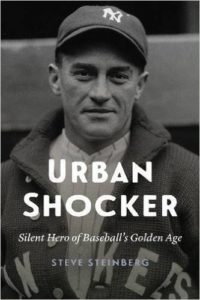 Urban Shocker: Silent Hero of Baseball’s Golden Age – Steve Steinberg – University of Nebraska Press – Hardcover – 9780803295995 – 352 pages – $32.95 – ebook versions available at lower prices – April 1, 2017
Urban Shocker: Silent Hero of Baseball’s Golden Age – Steve Steinberg – University of Nebraska Press – Hardcover – 9780803295995 – 352 pages – $32.95 – ebook versions available at lower prices – April 1, 2017
Even avid baseball fans may be forgiven for not knowing much about Urban Shocker, one of the best pitchers of major league baseball’s early modern era. It is no surprise that Shocker is not as famous as he could and should be. Shocker’s best years were spent in St. Louis, playing for the perennially mediocre Browns. And his time as a Yankee teammate of Babe Ruth was tragically cut short by ill health. Furthermore, he was a star player at a time when baseball was much more of a local sport – no television to memorialize his achievements – his face and skill as a pitcher is virtually invisible to us, now almost 100 years since his glory years.
Steve Steinberg is a talented baseball historian and writer. His work in uncovering the story of this undeservedly ignored pitcher is admirable. Baseball history can be a rich vein to mine, but it requires talented and dedicated individuals to do the incredibly time consuming work of research, and then to transform those details into a compelling narrative arc. Steinberg succeeds in both respects, and with this fine book, he brings Urban Shocker to life for contemporary readers.
Even if you are not a diehard baseball fan, Shocker’s life reveals a great deal about baseball and its players as part of the culture and daily life of America in the immediate post World War I (Roaring Twenties) era. Baseball players lived much more difficult lives than their modern descendants, it seems. And of course, the business of baseball was very different then – players were tied to their teams for life, and had very little control over their own destinies. While they were paid well compared to the average worker of the day, in relative terms, their paychecks were not usually life changing and most players had to work other jobs during the off seasons.
Little is known of Shocker’s early life, and he did not make it to the big leagues until he was in his early twenties. Like many players of the day, his path to success was not an easy one. And once he reached the majors, playing for the Yankees before their great success years, he was quickly traded away to the St. Louis Browns in 1918. It was not until 1925, after four straight seasons with at least twenty wins for the lowly Browns that Urban was finally traded back to the Yankees. He finally had the opportunity to play in the World Series with the 1926 Yankees.
In the almost mythological 1927 season, often considered to be among best in baseball history, Shocker pitched brilliantly to compile 18 wins against only 6 losses, this at a time when his skills were clearly in decline. Shocker was suffering from a then incurable heart disease that would kill him less than a year later. He kept his illness to himself, and managed to excel as a pitcher using his years of experience to substitute for physical dominance before he finally had to quit the game altogether, surprising the baseball world at the time.
Steinberg has given us a deftly written, detailed and sensitive portrait of a complicated man, whose brilliant baseball career was cut all too short. I enjoyed reading this compelling biography immensely – it brought me back to a period of baseball history I have long been interested in – and I had a great time speaking with author Steinberg about this book and his work in baseball history.
Steve Steinberg is known as a baseball historian of the early 20th century. He was fortunate to have sold a family business, allowing him to explore a new career as a baseball writer. He focuses his work on portraying long-forgotten players, bringing them to the attention of contemporary baseball fans and readers. He is the author or co-author of several books and many articles, including with Lyle Spatz, 1921: The Yankees, the Giants, and the Battle for Baseball Supremacy in New York. Steve’s web site is a wealth of baseball history. He lives in Seattle with his wife, Colleen.
Podcast: Play in new window | Download
Phillip Lopate: A Mother’s Tale
January 15, 2018 by David
Filed under Non-Fiction, WritersCast
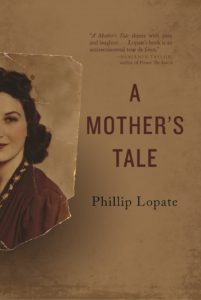 A Mother’s Tale – Phillip Lopate – Mad River Books (Ohio State University Press) – Hardcover – 9780814213315 – 196 pages – $24.95 – ebook versions available at slightly lower prices – January 12, 2017
A Mother’s Tale – Phillip Lopate – Mad River Books (Ohio State University Press) – Hardcover – 9780814213315 – 196 pages – $24.95 – ebook versions available at slightly lower prices – January 12, 2017
It might be said that a good memoir is a hard thing to find. It takes a special touch from a writer. The best memoirs have humor and self awareness – one must be selective in choosing what is important to share and what must be omitted, valuable to one’s self but not so much for the reader.
Philip Lopate is a skilled and experienced writer who inherently understands the necessities of writing about self and family. His mother was a complicated person, his family life unusual and full of strange twists and turns that made him and his brother who they are as adults.
In 1984, Lopate convinced his mother, Frances, to allow him to interview her and record the story of her life. Frances was a powerful and strong willed figure. She was orphaned in childhood, married young, and had to make a life for herself without a support system, as a mother. She worked in a number of fields and late in life became an actress and singer. She appeared in television commercials and performed in plays in New York.
She told Philip all her many criticisms of her husband (his father), recounted the details of her affairs and sexual encounters, told him about her experiences with therapy and continuously complained about how the world had mistreated and misunderstood her. Locate set the tapes aside and never listened to them until thirty years later, when his mother had passed away. At that point Lopate was drawn back to the recordings, perhaps wanting to better understand his mother and himself through her confessions.
A Mother’s Tale is essentially then a three-way conversation between Lopate today, his mother, and the younger self he hears talking to her on the tapes.
Lopate seeks to better understand and appreciate his mother and the husband she ostensibly despised, but could never leave. He cannot share her self-pity or the harping on blame assessed to everyone but herself. But through it all, he comes to see her anew, now as a grown man, recognizing more clearly the survivor, her powerful appetite for love and for life, and the ways he finally found to express his love for her.
It’s a brave thing to expose oneself and one’s family in such a personal piece of writing. Lopate has succeeded with this short memoir, giving us much to savor, appreciate, and ponder about ourselves and our own family histories. This is a terrific book.
“With his signature insight an candor, Lopate reveals his mother for the complicated and troubled character she was, and himself–her darling, her confessor, her victim, her judge–as the child behind the writer he was to become. I could not put it down.” — Lynn Freed
Philip Lopate is the author of a number of well respected memoirs and personal essays, as well as two novellas, and is also the editor of several important anthologies. He has won a variety of awards for his writing, as well as for his work as a teacher. He is currently a professor at Columbia University’s School of the Arts, where he teaches nonfiction writing.
Philip Lopate is a wonderful conversationalist and an easy person to interview. It was a tremendous pleasure for me to speak with him about this book and his intriguing mother.
Author website here. Author photo by Sally Gall.
Podcast: Play in new window | Download
Thomas McNamee: The Inner Life of Cats
November 12, 2017 by David
Filed under Non-Fiction, WritersCast
 The Inner Life of Cats: The Science and Secrets of Our Mysterious Feline Companions – Thomas McNamee – Hachette Books – Hardcover – 9780316262873 – 288 pages – $27.00 – ebook versions available at lower prices – March 28, 2017
The Inner Life of Cats: The Science and Secrets of Our Mysterious Feline Companions – Thomas McNamee – Hachette Books – Hardcover – 9780316262873 – 288 pages – $27.00 – ebook versions available at lower prices – March 28, 2017
What a fun read! Thomas McNamee’s story begins with the story of finding his own cat, Augusta, and that story becomes the framework for a comprehensive understanding of how cats develop both physiologically and psychologically, and of course how their owners do as well.
McNamee recounts the evolution of cats and much more as he tells the story of his own cat’s adventures. He talks to all kinds of experts, animals behaviorists, activists and researchers to help his readers understand these strange and different animals who have lived with and among humans for so long. His book is well grounded in every way.
The author has strong opinions about these animals. He is clearly someone who loves cats and wants to improve the way other cat lovers live with and treat their pets. He aims for them to have happier and better relationships with them, and I suspect that reading this book will in fact help make that happen for them.
While I am decidedly not a cat person, Tom McNamee is such a fine writer and storyteller, I found this book impossible to put down. I am guessing true cat loving humans will as well.
McNamee is the author of several successful books, including The Grizzly Bear; Nature First: Keeping Our Wild Places and Wild Creatures Wild; a novel, A Story of Deep Delight; The Return of the Wolf to Yellowstone; Alice Waters and Chez Panisse: The Romantic, Impractical, Often Eccentric, Ultimately Brilliant Making of a Food Revolution; The Man Who Changed the Way We Eat: Craig Claiborne and the American Food Renaissance; and most recently, The Killing of the Wolf Number Ten.
McNamee also wrote the PBS documentary Alexander Calder, which won a Peabody Award and an Emmy. In 2016, he was awarded a Guggenheim Fellowship to work on The Inner Life of Cats.
He was a board member and chairman of the Greater Yellowstone Coalition. He has also served as a board member of Rare Conservation and the Center for Urban Education about Sustainable Agriculture. After two decades in New York City, he then lived on a cattle ranch in Montana for eight years. He now lives and writes in San Francisco.
Thomas McNamee’s website is here.
“The Inner Life of Cats is filled with shining prose, moments of sheer cat joy–and intimate, careful scientific observation. Thomas McNamee’s naturalist’s eye, combined with his humor and heart, bring the always wild, yet domesticated cat into delightful, insightful focus.”
―Cat Warren, New York Times bestselling author of What the Dog Knows
Talking with Tom about this book was a true pleasure. Full disclosure: I published his excellent book, The Killing of Wolf Number Ten (a great book – it is the story of the return of wolves to Yellowstone National Park).
Podcast: Play in new window | Download
Elizabeth Farnsworth: A Train through Time – A Life, Real and Imagined
October 15, 2017 by David
Filed under Fiction, WritersCast
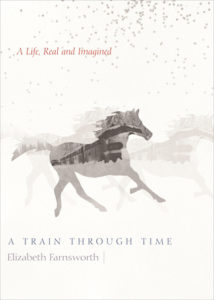 A Train through Time: A Life, Real and Imagined – Elizabeth Farnsworth – Counterpoint – Hardcover – $25.00 – 160 pages – February 14, 2017 – ebook versions available at lower prices
A Train through Time: A Life, Real and Imagined – Elizabeth Farnsworth – Counterpoint – Hardcover – $25.00 – 160 pages – February 14, 2017 – ebook versions available at lower prices
“I began this book with a sense of discovery and finished it in a state of exaltation. Along the way it broke my heart. It has been a long time since I read a book so moving, plain spoken and beautiful. The instant I finished it, I went back to the beginning and started in again.” ―Michael Chabon
This slim – and gorgeously produced – memoir is one of the most striking and memorable books I have read recently. I have to simply echo what Chabon said about it – Elizabeth Farnsworth has written something very special, a book that does not fit easily into our conception of book categories – and that is a good thing. Her book is an exploration of childhood memories of loss and of family life that woven together with more recent stories of her work as a journalist and documentary film maker, are built into a fictional structure. The book forms an almost dream state to carry the author (and the reader) through her story.
Farnsworth interrogates her own understanding of events, real and imagined, to understand the arc of her life. It is a truly magical journey of self and psyche.
A Train through Time is illustrated with the remarkable photo art of Mark Serr, whose works contribute to the ethos and sensibility of the book, as well as providing us with a beautiful and dreamy cover image.
Of course it helps that Farnsworth is a fine writer and a terrific storyteller. I was deeply moved by this book, and really enjoyed having the opportunity to speak with the Ms. Farnsworth about her story, about trains, journeys, and life in general. As an experienced television personality, she is very comfortable in recorded conversation and we had a great talk together, which I hope you will enjoy.
Elizabeth Farnsworth is a filmmaker and a foreign correspondent. For many years, she was the chief correspondent on the PBS NewsHour hosted by Jim Lehrer. During her career, she traveled widely to report on stories in Cambodia, Vietnam, Chile, Haiti, Iraq, and Iran and many other places. Farnsworth grew up in Topeka, Kansas, has a B.A. from Middlebury College, an M.A. in history from Stanford University and now lives in Berkeley, California.
Her documentaries include The Judge and the General (2008) and The Gospel and Guatemala (1983).
You can learn more about the author and A Train Through Time at the Counterpoint website here.
Podcast: Play in new window | Download
Nancy MacLean: Democracy in Chains: The Deep History of the Radical Right’s Stealth Plan for America
September 26, 2017 by David
Filed under Non-Fiction, WritersCast
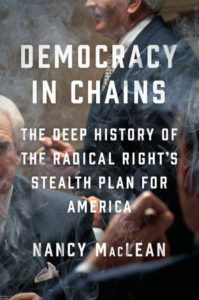 Democracy in Chains: The Deep History of the Radical Right’s Stealth Plan for America – Nancy MacLean – Viking – Hardcover – 9781101980965 – $28.00 – 368 pages – June 13, 2017
Democracy in Chains: The Deep History of the Radical Right’s Stealth Plan for America – Nancy MacLean – Viking – Hardcover – 9781101980965 – $28.00 – 368 pages – June 13, 2017
I will say this clearly and forthrightly: whatever your political opinions or positions, you must read this book. It shines an important light on the history of what has now become the most potent force in modern American politics. This book reveals in detail how the Koch brothers and other shadowy billionaires’ political philosophy has been weaponized in an ongoing war against democratic beliefs and institutions.
Professor MacLean came across this historical record more or less by accident, while she was researching the Nobel Prize-winning political economist, James McGill Buchanan, the principal architect of the ideas and institutions the Koch brothers and their allies have harnessed to radically alter the American political landscape in their distorted image of “economic libertarianism.” This philosophy fully recognizes that anti-democratic efforts are necessary to secure the wealth of the few against the “predations” of the democratic majority, and all their work for the last forty years or more has been aimed toward controlling and weakening democratic institutions. They have been remarkably successful in their efforts.
There is so much to learn in this book, yet still so much more for us to uncover, and ultimately then, so much that needs to be done by those who feel the need to defend democratic liberalism and American institutions. It is remarkable to learn that this effort is essentially part of a longstanding effort to reach far back into our history to undo FDR’s democratic reforms, as well as those of JFK, LBJ, and the civil rights movement. And that Charles Koch is so ironically a follower of the principles of that old Bolshevik, V.I. Lenin.
We learn here that Koch and his cronies have built a secret cadre of true believers who want to do what their hero Buchanan did in Pinochet’s Chile, which was to use the institutions of government to control and contain democracy. They have come a long way toward succeeding in our own country, as most citizens are completely unaware of what they are doing, especially with their takeover of the judiciary. And in Trump’s America, they are free to have their way with us.
One way you can tell Nancy MacLean has made an impact with her research is the level and sheer ferocity of mostly personal attacks from the right against her. Those who post in opposition seem to have neither read the book, nor care to think about the author’s actual work. One of the tools used by the Koch-financed opponents of democracy is the personal attack and what they call the “increased transaction cost” for anyone who opposes their views. Since they usually cannot win intellectual or even political arguments, they prefer to disparage and attack those who dare stand against them on other grounds than reason.
I urge listeners to read this book, think about what MacLean has uncovered, and then, if you agree with what she says, use what you learn from this book to stand up for freedom and democracy against oligarchy.
“This sixty-year campaign to make libertarianism mainstream and eventually take the government itself is at the heart of Democracy in Chains. . . . [MacLean] takes the time to meticulously trace how we got here. . . . If you’re worried about what all this means for America’s future, you should be. . . . And if someone you know isn’t convinced, you have just the book to hand them.”
—NPR
“It’s the missing chapter: a key to understanding the politics of the past half century. To read Nancy MacLean’s new book, Democracy in Chains: The Deep History of the Radical Right’s Stealth Plan for America, is to see what was previously invisible.”
—George Monbiot, The Guardian
“[A] riveting, unsettling account of ‘Tennessee country boy’ James McGill Buchanan, key architect of today’s radical right.”
—O, The Oprah Magazine
Nancy MacLean is also the author of Behind the Mask of Chivalry (a New York Times “noteworthy” book of the year) and Freedom is Not Enough. She is currently the William Chafe Professor of History and Public Policy at Duke University, and lives in Durham, North Carolina.
Podcast: Play in new window | Download
Madeleine Blais: To the New Owners-A Martha’s Vineyard Memoir
August 20, 2017 by David
Filed under Non-Fiction, WritersCast
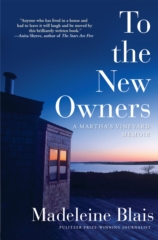 To the New Owners: A Martha’s Vineyard Memoir – Madeleine Blais – Atlantic Monthly Press – Hardcover – 978-0-8021-2657-3 – $26.00 – 272 pages – July 2017 (ebook versions available at lower prices)
To the New Owners: A Martha’s Vineyard Memoir – Madeleine Blais – Atlantic Monthly Press – Hardcover – 978-0-8021-2657-3 – $26.00 – 272 pages – July 2017 (ebook versions available at lower prices)
Madeleine Blais is a truly wonderful writer – she began her writing career as a journalist, now teaches journalism at the University of Massachusetts, and won a Pulitzer Prize for her 1994 book In These Girls Hope is a Muscle. But I had never really read her work before my friend George Gibson, knowing I had spent time on Martha’s Vineyard, recommended this book to me. Reading this book was a great experience for me, one of those times when I found myself reading sections aloud to my wife, who spent most of her life going to Martha’s Vineyard each summer. This book is full of beautiful passages about place, family, and the magical experiences that summer vacations engender for so many of us.
Back in the 1970s, Madeleine Blais married into the Katzenbach family, and with them, their somewhat rustic vacation house on Martha’s Vineyard. Located on an old one-lane dirt road, the house was more a shack, without electricity or running water. But for spending old fashioned quiet vacations decompressing from daily life, the house was ideal, and very representative of the kinds of places that were then common in traditional east coast vacation spots.
The house was near Tisbury Great Pond, facing the ocean and open to the sky, and over the years, the old shack was rebuilt and modernized, but the more or less rustic lifestyle of the family and their visitors remained a constant. There was no heat, no TV, and no telephone, and typically terrible cell service. But as Blais documents, the days were marked by time spent on the beach and on the Vineyard’s beautiful waters, meals prepared and enjoyed with extended family and their many visiting friends, all logged in a series of notebooks made by the family over the decades – almost half a century of family stories to be preserved and loved.
But life is full of changes and with the passing of the original family owners, in 2014, the house was sold. In To the New Owners, Madeleine Blais tells some of these stories of the house and her family’s life within it, and stories of the Vineyard, including some of its recent history, and some of the people whose visits have now made it so well known.
But this book is really about the places that matter in our lives, the power of place to ground and center our lives and the importance of memory and stories to help us understand who we are.
While this book is a memoir about this one distinctive east coast island, it will resonate for the many of us who have experienced well-loved places that have changed over time. Change is the constant feature of modern life, and family summer places like this one may be disappearing forever. New generations will find their own ways to understand and appreciate the places around which they build their histories. Those of us who have had the pleasure of experiencing Martha’s Vineyard will likely love this book as much as we love the island itself, and remind us of our own stories and the memories that keep us whole.
Madeleine Blais was a reporter for the Miami Herald for years before joining the faculty of the School of Journalism at the University of Massachusetts. She is the author of In These Girls, Hope Is a Muscle, Uphill Walkers, and The Heart Is an Instrument, a collection of her journalism. She lives in Amherst, Massachusetts.
Aside from being a fine writer, Madeleine also tells great stories, and gave us a wonderful interview. Special thanks to George Gibson for recommending this excellent book to me.
“For anyone who has ever been curious about life on the Vineyard, or fantasized about settling in, Blais offers a diverting portrait . . . Blais has stitched together [the memoir] from the writings and stories of others, as well as her own wistful, often wry observations . . . Throughout, Blais exhibits a veteran reporter’s instinct for even-handedness.”―Boston Globe
Podcast: Play in new window | Download
Jane Ziegelman and Andrew Coe: A Square Meal: A Culinary History of the Great Depression
July 17, 2017 by David
Filed under Non-Fiction, WritersCast
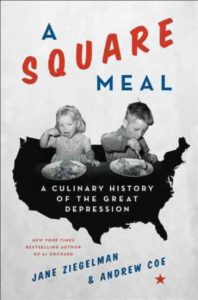 A Square Meal: A Culinary History of the Great Depression – Jane Ziegelman and Andrew Coe – HarperCollins – paperback now available – 9780062216427 – 336 pages – $15.99 – ebook versions available at lower prices.
A Square Meal: A Culinary History of the Great Depression – Jane Ziegelman and Andrew Coe – HarperCollins – paperback now available – 9780062216427 – 336 pages – $15.99 – ebook versions available at lower prices.
First, let me say that this is one of the most interesting, readable and thought-provoking works of American history I have read in a long time. It’s interesting to think about how two writers can work together to create a consistent and compelling authorial voice – Andrew and Jane have done that brilliantly. One must assume they have a very special marriage that enables them to both collaborate and live happily together.
If you are interested in food and how the American palate has changed over time, this book will certainly have much to offer. But I think the story here is broader than it may first appear. It’s not just a “culinary history” but a comprehensive social history of one of the most important periods of American life told through the issues surrounding food and nutrition in a challenging time.
Yes, it is “an in-depth exploration of the greatest food crisis the nation has ever faced – and how it transformed America’s culinary culture,” but I think the larger story is that this book uses food as the lens to through which to view how Americans lived during our greatest economic and cultural crisis.
History writing that brings the past to life and engages us in the human dimensions of the big moments of the past is real storytelling. This kind of writing helps us understand and sympathize with the people who came before us. It makes us better able to deal with our own crises, of which there are indeed many.
So this book is important whether food is “your thing” or not. I’d recommend reading it no matter your specific interests, just because it will make you think, will make you care, and will help you to feel that the past really is always prologue. It was a great pleasure to have the opportunity to talk in person with Jane and Andrew about A Square Meal.
Jane Ziegelman is the director of the Tenement Museum’s culinary center and is founder and director of Kids Cook!, a multiethnic cooking program for children. Her writing on food has appeared in numerous publications, and she is the coauthor of Foie Gras: A Passion.
Andrew Coe is a writer and independent scholar specializing in culinary history, and the author of Chop Suey: A Cultural History of Chinese Food in the United States, which was a finalist for a James Beard Award. He appeared in the documentaries The Search for General Tso and Eat: The Story of Food. Jane and Andrew live in Brooklyn, New York. And recently, A Square Meal was announced the winner of the 2017 James Beard Award for best nonfiction book of the year.
NPR’s Fresh Air did a wonderful interview (called “Creamed, Canned and Frozen”) with Jane and Andy about this book in August, 2016. And I interviewed Andy about his book, Chop Suey for Writerscast a few year ago.
Photo of the authors by Sasha Maslov for The New York Times.
Podcast: Play in new window | Download
Elizabeth Hand: Fire
May 11, 2017 by David
Filed under Fiction, WritersCast
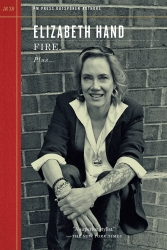 Fire (Outspoken Authors Series) – Elizabeth Hand – PM Press – paperback – 978-1-629632-34-6 – 128 pages – paperback – $12.98 (ebook version available at $9.99)
Fire (Outspoken Authors Series) – Elizabeth Hand – PM Press – paperback – 978-1-629632-34-6 – 128 pages – paperback – $12.98 (ebook version available at $9.99)
Over the years, I had heard of Elizabeth Hand, and knew she was a writer to be reckoned with, but I had never read her science fiction and mystery novels or stories. She was just not on my radar. Now, having read this fantastic short collection of some of her fiction and nonfiction, I have belatedly begun to understand the scope of her work and enjoyed the opportunity to experience her powerful writing.
Fire is a short book that packs a big punch. Maybe it is the ideal introduction to Hand’s work, and maybe that was PM Press’ intention in publishing it. The title story was written especially for this book. It is a powerful post-apocalyptic short story set in a world – our own – approaching global conflagration.
In a useful essay, “The Woman Men Couldn’t See,” Hand examines the work and life of Alice Sheldon, who wrote some stunning science fiction novels under the pseudonym “James Tiptree, Jr.” in order to conceal identity from both readers and her bosses at the CIA. In another nonfiction contribution called “Beyond Belief,” Hand talks about how she went from being a troubled teenager to a serious writer. Other pieces include some of her short fiction, a bibliography of her writing, and PM’s own interview with the author (which I tried to not replicate in my own conversation with Elizabeth).
After seeing Patti Smith perform, Hand became involved in the nascent punk scenes in DC and New York. She worked at the Smithsonian’s National Air and Space Museum in Washington, D.C. Hand is the author of a number of novels and three collections of stories and her work has been recognized by the Nebula, World Fantasy, Mythopoeic, Tiptree, and International Horror Guild Awards. Her novels have been chosen as notable books by both the New York Times and the Washington Post. Hand is a regular contributor to the Washington Post Book World and the Magazine of Fantasy and Science Fiction, and lives with her family on the coast of Maine.
Talking to Elizabeth Hand was great fun for me. She is as good a conversationalist as she is a writer, and has alot to say that I think listeners will find interesting. I hope this interview with Elizabeth Hand will be a useful and meaningful contribution to our literary landscape. Now that I have become familiar with her work I intend to add Elizabeth Hand’s fiction to my ever expanding list of “must-read” books. Thanks to PM Press for introducing me to this wonderful writer’s work.
Podcast: Play in new window | Download


